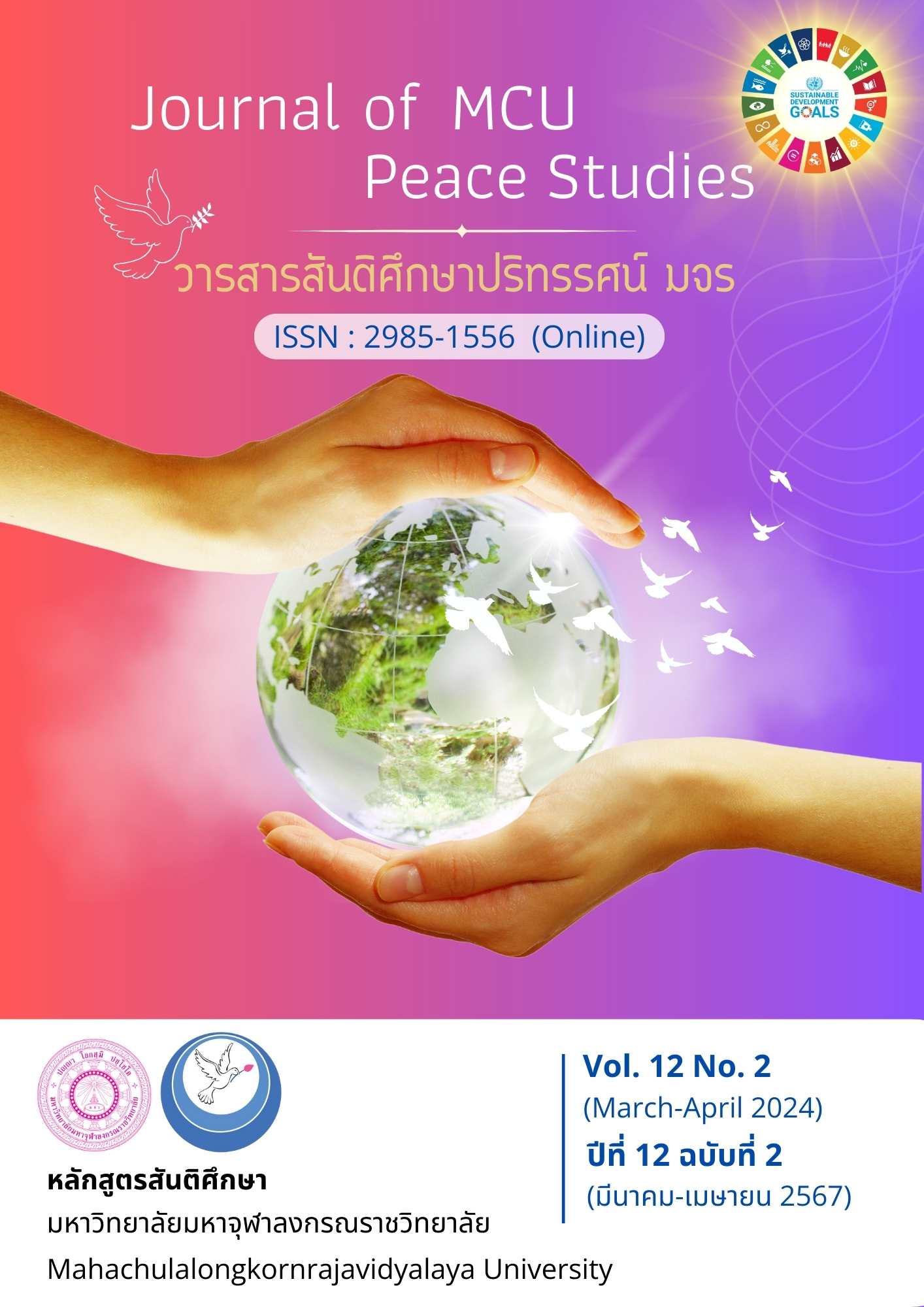The Relationship between Learning Participation and Learning Burnout among Thai Students in Printmaking Program: Psychological Capital for Psychological Management
Main Article Content
Abstract
The research aims to study the relationship between learning participation and learning burnout among Thai students in Printmaking program: Psychological Capital for Psychological Management. The objectives of the study are 1) to study the study learning engagement and learning burnout among Printmaking program students at Thai universities, 2) to explore the role of psychological capital in the relationship between participation and learning burnout Participate in learning and learning burnout among students in the Printmaking program, the psychological capital in learning engagement and learning burnout issue. The research tools used in the study is a research questionnaire by sampling method to facilitate data analysis, regarding participation in learning, psychological capital, and learning burnout among Printmaking students.
The research results show that the relationship between engaged learning and academic burnout among graphic arts students. The positive relationship between active learning and academic burnout among graphic arts students is at a significant level (r =.389, p<0.001), which is a low relationship. And there is a positive relationship between active learning and students' psychological capital to a significant level (r =.717, p<0.001), which is a moderate relationship and considering the relationship between psychological capital and students' academic burnout, which reaches a significant level (r =.417, p<0.001), it is a moderately moderate relationship.
Article Details

This work is licensed under a Creative Commons Attribution-NonCommercial-NoDerivatives 4.0 International License.
Views and opinions expressed in the articles published by The Journal of MCU Peace Studies, are of responsibility by such authors but not the editors and do not necessarily reflect those of the editors.
References
Bishop, N., & Mabry, H. (2016). Using Qualitative Data to Identify Student Learning Barriers and Alleviate Instructor Burnout in an Online Information Literacy Course. Internet Reference Services Quarterly, 21(3-4), 63-80.
Dubuc-Charbonneau, N., & Durand-Bush, N. (2018). Helping Student-athletes Learn to Self-regulate to Alleviate Burnout: A Multiple Case Study Showcasing their Challenging but Altering Experiences. Qualitative Research in Sport, 10(3), 1-18.
Goldsmith, A. H., Veum, J. R., & Darity, W. (1997). The Impact of Psychological and Human Capital on Wages. Economic Inquiry, 35(4), 815-829.
Hou, Y., & Yuan, M. (2019). Relationship between Time Management Disposition and Learning Burnout among Undergraduates in Medical University: Mediating Effect of Academic Self-efficacy. In Proceedings of the 2019 International Conference on Pedagogy, Communication and Sociology (ICPCS 2019) (pp. 304-318). Retrieved October 12, 2023, from https://www.atlantis-press.com/
Janprasert, B. (2019). A Development of Study Burnout Measurement Tool Using Anchoring Vignette. Veridian E-Journal, Silpakorn University (Humanities, Social Sciences, and Arts), 12(1), 825-845.
Luthans, F., & Youssef-Morgan, C. M. (2017). Psychological Capital: An Evidence-based Positive Approach. Annual Review of Organizational Psychology and Organizational Behavior, 4, 339-366.
Luthans, F., Avolio, B. J., Avey, J. B., & Norman, S. M. (2007). Positive Psychological Capital: Measurement and Relationship with Performance and Satisfaction. Personnel Psychology, 60(3), 541-572.
Maslach, C. (1986). Stress, Burnout, and Workaholism. In R. Kilburg, R. Thoreson, P. Nathan (Eds.), Professionals in Distress: Issues, Syndromes and Solutions in Psychology (pp.53-75). Retrieved October 2, 2023, from https://www.apa.org/search?query=Professionals%20in%20Distress:%20Issues,%20Syndromes%20and%20Solutions%20in%20Psychology
Maslach, C., & Jackson, S. E. (1981). The Measurement of Experienced Burnout. Journal of Organizational Behavior, 2(2), 99-113.
Ministry of Education. (2002). National Education Act B.E. 2542 (1999) and Amendments (Second National Education Act B.E.2545 (2002). Retrieved May 3, 2013, from https://www.sl.ac.th/addons/qa/9.pdf
Phongpisanrat, Ch. (2022). The Study of Learning Burnout of Mahasarakham University Students. Journal of Educational Measurement Mahasarakham University, 28(2), 95-110.
Stevens, L. A. et al. (2017). Designing an Individualized EHR Learning Plan for Providers. Applied Clinical Informatics, 8(3), 924-935.
Xiaohua, K. (2018). The Relationship between College Students’ Mental Health and Study Burnout. (Master's Thesis). Shandong Normal University. Jinan City. China.


